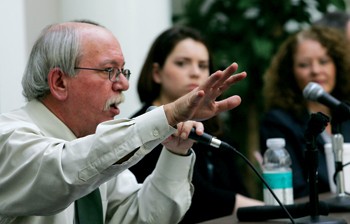
Political Science professor Dennis Simon (left) speaks to students at the forum on drug and alcohol abuse Wednesday afternoon in the Hughes-Trigg Commons. (John Schreiber)
Hilltopics and the University Honors Program sponsored a Substance Abuse Forum featuring Hilltopics business manager senior Todd Baty with members of the Task Force on Substance Abuse Prevention. Dean of Student Life Dee Siscoe, professors Dennis Foster and Dennis Simon, and Student Body President Katherine Tullos met in the Hughes-Trigg Commons to actively discuss, debate and engage the issue of substance abuse at SMU as a component of the overall academic experience.
Unfortunately, the panelists did not have much to deliberate on due to the forums low attendance, but that did not stop them from making their voices heard. Each of the panelists gave a personal reason for their participation in the group discussion.
Foster, and English professor, started the discussion with his concerns on the low attendance and engagement during classes.
“Students are skipping many of their classes and putting in 10 or less hours of work a week instead of 30 to 40 because their social lives are occupying so much of their time and energy,” Foster said. “Our students need to re-evaluate what freedom in school really is and reestablish their priorities.”
Next on the panel to speak was Siscoe who offered her administrative insight on what she described as “an issue around the country.” Siscoe chose to speak through her many statistics, such as how over 1,700 college students die from alcohol-related incidents every year, a point made by the Gordie Foundation’s flag showing just a few weeks ago for the National Collegiate Alcohol Awareness week.
Tullos vocalized her disappointment in the SMU students’ ownership over the culture.
“Students do not realize the amount of power we could have on this campus if only we come together and recognize issues such as these,” Tullos said.
Todd Baty, who organized the entire event, expressed his apprehension of how many SMU students “get through their college education with severe substance abuse problems.” Baty then alluded to the issue brought up by Foster when he reiterated the necessity of students to reprioritize their lives and to put “education ahead of entertainment.”
The final panelist, Simon, a political science professor, expressed his opinions on what he referred to as a narcotic “post-era.”
“There are three kinds of students in class: one, the engaged, two, the magnificently underachieved, and three, the academic black holes,” Simon said.
Simon went on to point out how “academics at the school have become tangential to the social behavior of its students.” Mostly, Simon felt great misunderstanding as to why students would want to be “academically invisible” and “politically silent” during such an “important time.”
Student reactions to the panelists were mixed. A handful expressed their concern for the student body behavior and recent headlines while others searched for understanding and expressed problems they found in some of the bureaucratic alienation and inefficiency in the judicial and law enforcement officers of SMU.
One point that most people could agree on, even despite the resources, statistics and data the Task Force could compile and the complaints and reports that were sent in, was that only friends of individuals in danger can make a true difference with the problem.
“The only people that could really know if someone was a problem are those closest,” Simon said.








